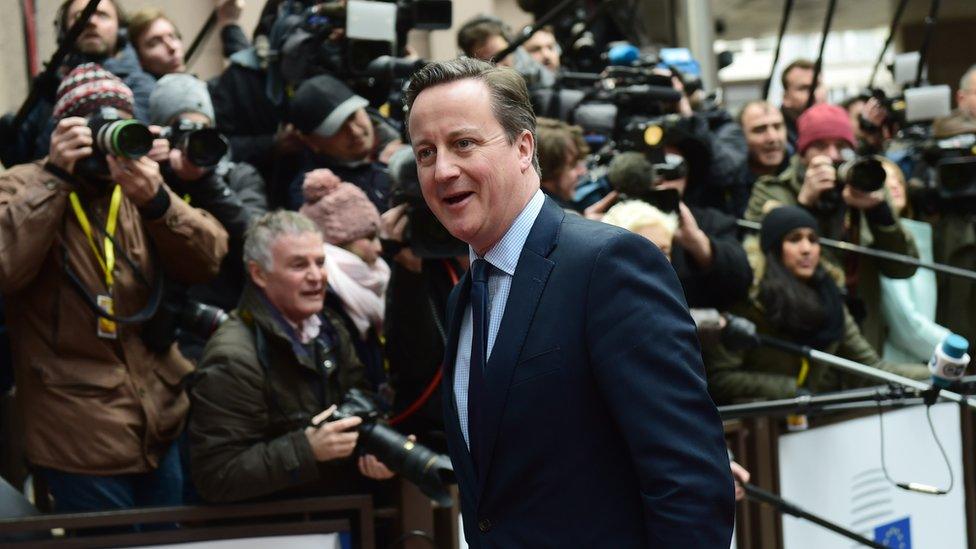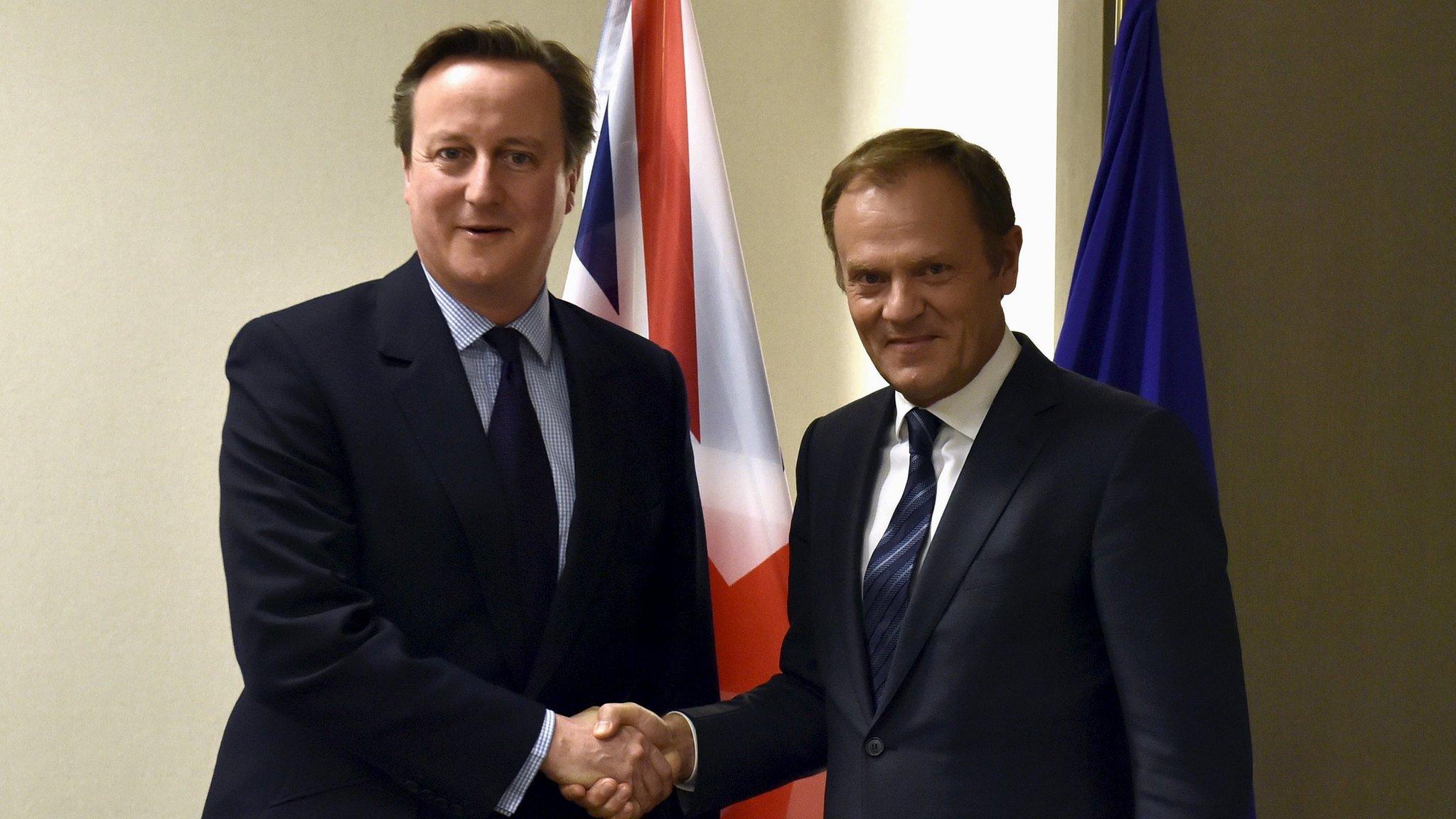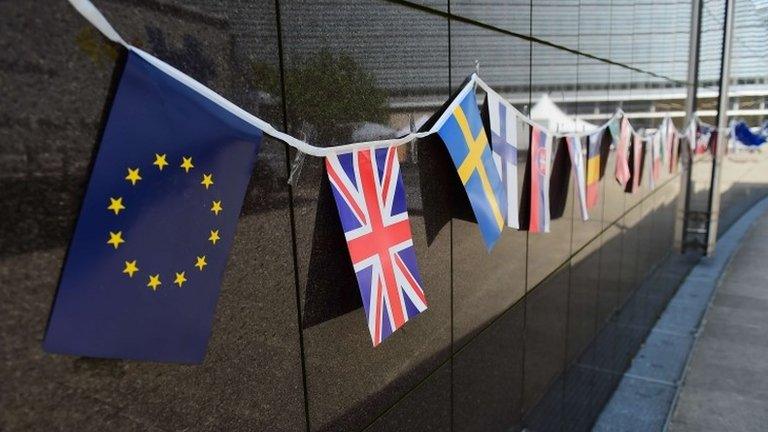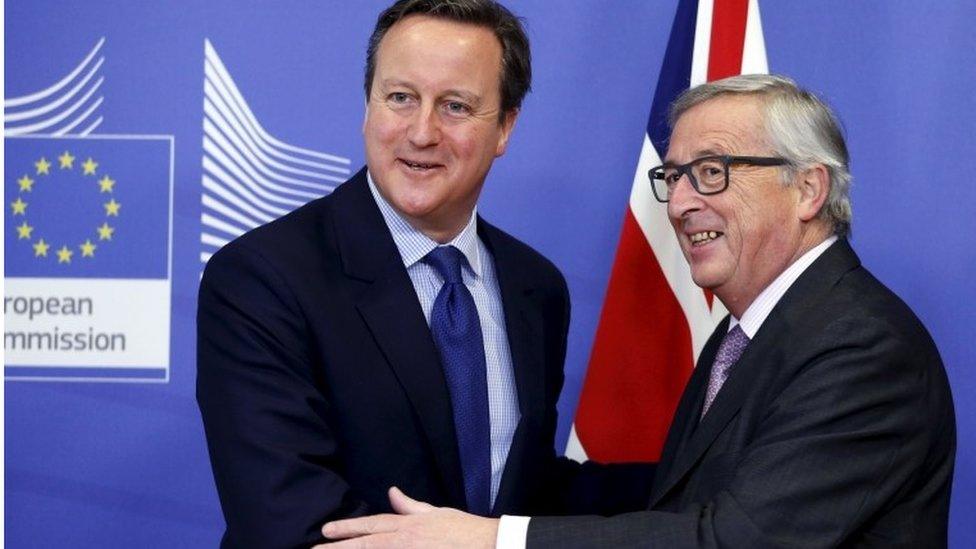Brussels comes to life for Brexit showdown
- Published

Many MEPs believe UK referendum came about because of Conservative party pressure
It is very rare that the EU headquarters in Brussels - that grey mono-suited town within a town - feels animated and alive. But it does at the moment.
Brexit - the possibility of the UK leaving the EU - has everyone talking, in many different European languages.
The prospect of a showdown between David Cameron and other EU leaders has sent a buzz of excitement shivering down the echoey halls of EU institution buildings
Basking in the great drama of it all, Donald Tusk, the president of the European Council, has taken to quoting the Great Bard - well, sort of. "To be or not to be - together," he wrote, external as he published Mr Cameron's draft proposals on Twitter.
There is certainly a touch of theatre about all this.
Playing to the gallery
Civil servants and MEPs I've spoken to in Brussels believe the expected UK referendum and Britain's EU renegotiation essentially came about because the PM was under pressure from his own Conservative party.
David Cameron arrives at EU summit 'to battle for Britain'
Yet in public, in the style of the Emperor's New Clothes, they go along with the idea that this is all for the British people.
But then Brussels is used to dealing with two UKs: one on stage, the other behind the scenes. Successive UK prime ministers have been openly dismissive, disparaging, even hostile at EU summits, "playing to their eurosceptic gallery at home," EU suits say knowingly, sotto voce, with a nod and a wink.
Then, in meeting rooms behind the garish stage curtains: "We really value you British," Spain's former minister for the EU told me. "You have humour, a no-nonsense approach and you think outside of the boxes," he added, adding that these virtues were not always so frequently found among other EU colleagues.
"We see Britain as a mother or a father-figure in Europe," a politician in Angela Merkel's CDU party explained to me last week. "We can't imagine you leaving the family."
Katya Adler looks at which European countries David Cameron can count on
Even though you're always clamouring for extrawurst, he said: "extra sausage, you know, I think you call it cherry-picking." The UK always has to be the most special amongst EU equals.
That of course is annoying for many. But because of its healthy economy, its diplomatic experience and the size of its military, the bottom line is that none of the other 27 EU countries wants to see the UK leave.
And yet a number of nations are queuing up to take a verbal punch at the prime minister at this summit: Central and Eastern European nations because of proposed cuts to EU migrant workers social benefits; the French over the very idea of safeguards for the City of London against eurozone legislation.
Migrant crisis
But this is the EU.
Other countries openly admire, or sometimes shiver, at the cut-and-thrust of Westminster politics but there's little whiff of that here in Brussels.
David Cameron says he needs this EU renegotiation deal from his European colleagues. After hours of heated debate, they will probably give it to him.
If not, the plot really does thicken. And we're in the realms of improvisation. The European Commission says there's no Plan B. It doesn't want to contemplate an EU without the UK.
But considering the probability that it'll be alright on the night, Shakespeare might have been tempted to describe this hullabaloo as Much Ado About Nothing.
That's certainly the viewpoint of the prime minister's domestic critics. They dismiss his reforms as meaningless even before they've been formalised.
But we have a few acts to sit though before a deal can done.
Hours of arduous argument with the tantalising prospect of an unpredictable outcome suits all the performers here.
France and Central and Eastern Europe can then claim they defended their voters' interests till the very end, while David Cameron can emerge crowing that he fought hard, winning the best deal he could for the people of Britain against the odds at this epic summit.
His European colleagues will then be able to turn their attention to another huge drama waiting in the wings: Europe's migrant crisis.
With continuing loss of life at sea and the breakdown in trust and co-operation between EU countries over what best to do, expect this unfolding tragedy now to take centre stage. Again.

Read more:

- Published16 February 2016
- Published2 February 2016
- Published2 February 2016
- Published31 January 2016

- Published17 February 2016

- Published29 January 2016
